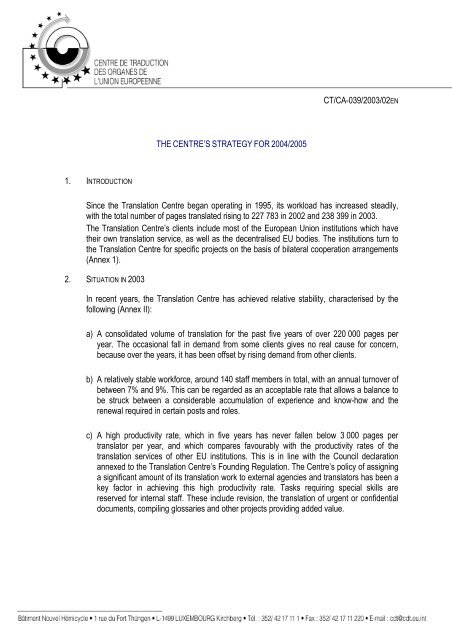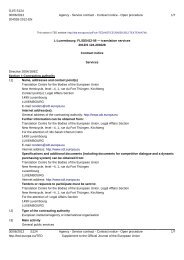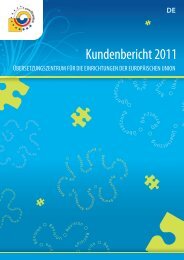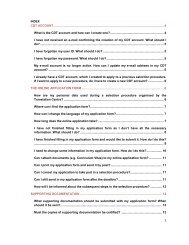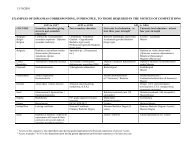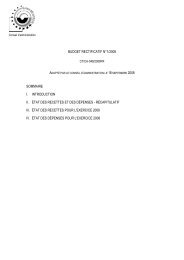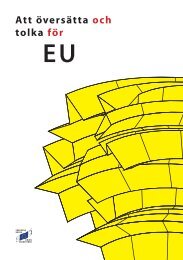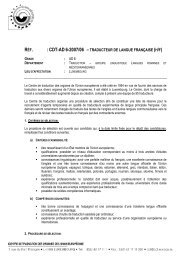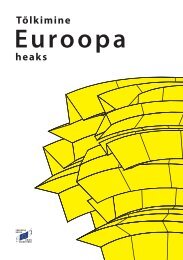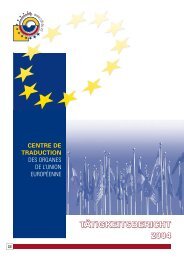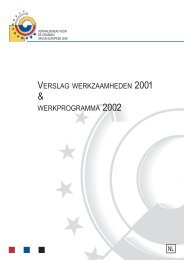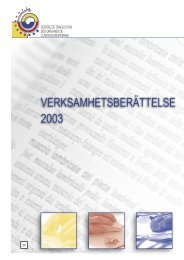Strategy for 2004-2005 - Translation Centre for the Bodies of the ...
Strategy for 2004-2005 - Translation Centre for the Bodies of the ...
Strategy for 2004-2005 - Translation Centre for the Bodies of the ...
Create successful ePaper yourself
Turn your PDF publications into a flip-book with our unique Google optimized e-Paper software.
CT/CA-039/2003/02ENTHE CENTRE’S STRATEGY FOR <strong>2004</strong>/<strong>2005</strong>1. INTRODUCTIONSince <strong>the</strong> <strong>Translation</strong> <strong>Centre</strong> began operating in 1995, its workload has increased steadily,with <strong>the</strong> total number <strong>of</strong> pages translated rising to 227 783 in 2002 and 238 399 in 2003.The <strong>Translation</strong> <strong>Centre</strong>’s clients include most <strong>of</strong> <strong>the</strong> European Union institutions which have<strong>the</strong>ir own translation service, as well as <strong>the</strong> decentralised EU bodies. The institutions turn to<strong>the</strong> <strong>Translation</strong> <strong>Centre</strong> <strong>for</strong> specific projects on <strong>the</strong> basis <strong>of</strong> bilateral cooperation arrangements(Annex 1).2. SITUATION IN 2003In recent years, <strong>the</strong> <strong>Translation</strong> <strong>Centre</strong> has achieved relative stability, characterised by <strong>the</strong>following (Annex II):a) A consolidated volume <strong>of</strong> translation <strong>for</strong> <strong>the</strong> past five years <strong>of</strong> over 220 000 pages peryear. The occasional fall in demand from some clients gives no real cause <strong>for</strong> concern,because over <strong>the</strong> years, it has been <strong>of</strong>fset by rising demand from o<strong>the</strong>r clients.b) A relatively stable work<strong>for</strong>ce, around 140 staff members in total, with an annual turnover <strong>of</strong>between 7% and 9%. This can be regarded as an acceptable rate that allows a balance tobe struck between a considerable accumulation <strong>of</strong> experience and know-how and <strong>the</strong>renewal required in certain posts and roles.c) A high productivity rate, which in five years has never fallen below 3 000 pages pertranslator per year, and which compares favourably with <strong>the</strong> productivity rates <strong>of</strong> <strong>the</strong>translation services <strong>of</strong> o<strong>the</strong>r EU institutions. This is in line with <strong>the</strong> Council declarationannexed to <strong>the</strong> <strong>Translation</strong> <strong>Centre</strong>’s Founding Regulation. The <strong>Centre</strong>’s policy <strong>of</strong> assigninga significant amount <strong>of</strong> its translation work to external agencies and translators has been akey factor in achieving this high productivity rate. Tasks requiring special skills arereserved <strong>for</strong> internal staff. These include revision, <strong>the</strong> translation <strong>of</strong> urgent or confidentialdocuments, compiling glossaries and o<strong>the</strong>r projects providing added value.
3. OUTLOOKWithin this context <strong>of</strong> relative stability <strong>for</strong> <strong>the</strong> <strong>Translation</strong> <strong>Centre</strong>, <strong>the</strong>re are several factors thatmerit special attention.Externally, <strong>the</strong> decision to enlarge <strong>the</strong> European Union by 10 new Member States on1 May <strong>2004</strong>, toge<strong>the</strong>r with <strong>the</strong> decision to increase <strong>the</strong> number <strong>of</strong> <strong>of</strong>ficial languages, willrequire changes in both <strong>the</strong> organisational structures and <strong>the</strong> working methods <strong>of</strong> <strong>the</strong>translation services <strong>of</strong> <strong>the</strong> EU institutions and, <strong>the</strong>re<strong>for</strong>e, <strong>the</strong> <strong>Translation</strong> <strong>Centre</strong>.Internally, a decision was adopted by <strong>the</strong> Management Board in 2002 to implement a totalquality management plan. Following its detailed preparation in 2002, <strong>the</strong> plan began to bearfruit in May 2003, when <strong>the</strong> European Foundation <strong>for</strong> Quality Management (EFQM) <strong>of</strong>ficiallyrecognised <strong>the</strong> <strong>Translation</strong> <strong>Centre</strong>’s <strong>for</strong>mal commitment to adopt a systematic and coherentquality strategy. This strategy encompasses all <strong>the</strong> processes and activities <strong>of</strong> <strong>the</strong> <strong>Translation</strong><strong>Centre</strong>, helping it to meet <strong>the</strong> objectives set by <strong>the</strong> Management Board, which, by virtue <strong>of</strong> itscomposition, is broadly representative <strong>of</strong> <strong>the</strong> <strong>Centre</strong>’s clients.These changes call <strong>for</strong> a detailed strategy to enable <strong>the</strong> <strong>Translation</strong> <strong>Centre</strong> to adapt itsorganisational structures and working methods to <strong>the</strong> new situation. This should include <strong>the</strong>result <strong>of</strong> measures instigated to take account <strong>of</strong> <strong>the</strong> Regulation <strong>of</strong> 18 June 2003 amending <strong>the</strong>Regulation setting up <strong>the</strong> <strong>Translation</strong> <strong>Centre</strong>. The <strong>for</strong>mer Regulation seeks to bring <strong>the</strong> latterinto line with <strong>the</strong> new Financial Regulation applicable to <strong>the</strong> general budget <strong>of</strong> <strong>the</strong> EuropeanCommunities and with Regulation (EC) No 1049/2001 <strong>of</strong> <strong>the</strong> European Parliament and <strong>of</strong> <strong>the</strong>Council regarding public access to European Parliament, Council and Commissiondocuments.At <strong>the</strong> same time, <strong>the</strong> <strong>Centre</strong> should turn its attention again to <strong>the</strong> matter <strong>of</strong> one <strong>of</strong> <strong>the</strong>conclusions reached by its Management Board on 14 March 2002 on <strong>the</strong> basis <strong>of</strong> <strong>the</strong> <strong>Centre</strong>’sexternal evaluation report. At this meeting, <strong>the</strong> Management Board had asked <strong>the</strong> EuropeanCommission to examine <strong>the</strong> possibility <strong>of</strong> including in <strong>the</strong> Regulation setting up <strong>the</strong> <strong>Translation</strong><strong>Centre</strong> an amendment authorising extension <strong>of</strong> <strong>the</strong> <strong>Centre</strong>’s remit to all public bodies, bothnational and international, whose activities are <strong>of</strong> interest to <strong>the</strong> European Union. It should benoted in that regard that, in its resolution <strong>of</strong> 21 April <strong>2004</strong> on <strong>the</strong> discharge to be given to <strong>the</strong>Director <strong>of</strong> <strong>the</strong> <strong>Centre</strong> in respect <strong>of</strong> <strong>the</strong> implementation <strong>of</strong> its budget <strong>for</strong> <strong>the</strong> financial year 2002(C5-0637/2003-2003/2247 (DEC)), <strong>the</strong> European Parliament ‘considers that <strong>the</strong> <strong>Translation</strong>[<strong>Centre</strong>] should be able to use any spare capacity, without prejudice to <strong>the</strong> priority toEuropean institutions, to provide services to o<strong>the</strong>r international organisations <strong>for</strong> a fee whichwould gradually reduce dependency on <strong>the</strong> Community budget’.There is <strong>the</strong>re<strong>for</strong>e a clear need to develop <strong>the</strong>se new guidelines and, to that end, <strong>the</strong> <strong>Centre</strong>will submit a detailed proposal to <strong>the</strong> European Commission in <strong>the</strong> course <strong>of</strong> <strong>2004</strong>.STRATEGY FOR <strong>2004</strong>/<strong>2005</strong> 2
4. STRATEGY FOR <strong>2004</strong> AND <strong>2005</strong>a) EnlargementThe enlargement scheduled <strong>for</strong> 1 May <strong>2004</strong> poses an unprecedented challenge <strong>for</strong> all EUinstitutions. Previous enlargements involved a maximum <strong>of</strong> two or three new Member States,but never as many as on this occasion. Nor are previous enlargements comparable inlanguage terms, because this time around, <strong>the</strong> number <strong>of</strong> <strong>of</strong>ficial languages is set to double.However, <strong>the</strong> <strong>Translation</strong> <strong>Centre</strong> does not intend to double ei<strong>the</strong>r <strong>the</strong> number <strong>of</strong> pages <strong>for</strong>translation or its staff numbers, on account <strong>of</strong> <strong>the</strong> demographic weight and infrequent use <strong>of</strong>some <strong>of</strong> <strong>the</strong> future <strong>of</strong>ficial languages. Fur<strong>the</strong>rmore, following <strong>the</strong> contact visits to <strong>the</strong> candidatecountries, it is clear that, in some cases, <strong>the</strong> curricula <strong>for</strong> university degrees in languages arenot always geared to <strong>the</strong> type <strong>of</strong> translation required by <strong>the</strong> EU institutions. As a result, <strong>the</strong><strong>Translation</strong> <strong>Centre</strong> believes it will not be easy to find experienced translators <strong>for</strong> all <strong>the</strong> futurelanguages at <strong>the</strong> initial stage.The <strong>Translation</strong> <strong>Centre</strong>’s latest <strong>for</strong>ecasts suggest no change in <strong>the</strong> workload <strong>for</strong> <strong>2004</strong>compared with 2003 <strong>for</strong> <strong>the</strong> current <strong>of</strong>ficial languages (approximately 257 500 pages, including157 000 <strong>for</strong> Community trademarks). The <strong>Centre</strong> expects approximately 82 000 additionalpages <strong>of</strong> Community trademarks and 31 000 pages <strong>of</strong> documents <strong>for</strong> <strong>the</strong> new <strong>of</strong>ficiallanguages as <strong>of</strong> 1 May <strong>2004</strong>, or a total <strong>of</strong> 113 000 pages, making a grand total <strong>of</strong> 370 500pages <strong>for</strong> both current and future <strong>of</strong>ficial languages.In order to meet this demand, in <strong>2004</strong> <strong>the</strong> <strong>Centre</strong> will endeavour to recruit two translators <strong>for</strong>each new <strong>of</strong>ficial language and two or three additional members <strong>of</strong> staff to work in supportroles in <strong>the</strong> Administration and Computer Departments and to tackle <strong>the</strong> increased difficultiesinvolved in subcontracting work to external agencies and translators.At <strong>the</strong> same time, in order to <strong>of</strong>fset <strong>the</strong> difficulties anticipated in <strong>the</strong> recruitment <strong>of</strong> experiencedtranslators <strong>for</strong> some <strong>of</strong> <strong>the</strong> new languages, <strong>the</strong> <strong>Translation</strong> <strong>Centre</strong> will increase cooperationwith external agencies and translators. This could see <strong>the</strong> volume <strong>of</strong> subcontracted work risefrom 55% to 60% <strong>of</strong> <strong>the</strong> total.To facilitate <strong>the</strong> smooth integration <strong>of</strong> translators <strong>of</strong> <strong>the</strong> new <strong>of</strong>ficial languages, <strong>the</strong> <strong>Translation</strong><strong>Centre</strong> has decided to assign <strong>the</strong> role <strong>of</strong> ‘tutor’ or ‘mentor’ to some <strong>of</strong> its most experiencedtranslators. Preference will be given to those translators who have attended language coursesin <strong>the</strong> relevant language and are <strong>the</strong>re<strong>for</strong>e likely to have a more in-depth knowledge <strong>of</strong> <strong>the</strong>relevant culture.If <strong>the</strong> <strong>for</strong>ecasts <strong>for</strong> <strong>2004</strong> prove correct and enlargement goes according to plan, in <strong>2005</strong> <strong>the</strong><strong>Translation</strong> <strong>Centre</strong> will be able to consolidate and secure <strong>the</strong> progress it has achieved to date.That is why, as things currently stand, <strong>the</strong> <strong>Centre</strong> does not expect any increase in <strong>the</strong> volume<strong>of</strong> pages <strong>for</strong> translation, although in <strong>2005</strong>, <strong>the</strong> effects <strong>of</strong> enlargement will be felt over 12 ra<strong>the</strong>rthan eight months. For that reason, one or two additional translators will be required <strong>for</strong> eachteam working in <strong>the</strong> new languages, and one additional translator will be required <strong>for</strong> each <strong>of</strong><strong>the</strong> teams working in <strong>the</strong> older languages with <strong>the</strong> heaviest workload (probably French,English and German). It is also expected that two additional members <strong>of</strong> staff will be required<strong>for</strong> <strong>the</strong> Administration and Computer Departments.b) Total quality planOnce <strong>the</strong> analysis <strong>of</strong> <strong>the</strong> <strong>Centre</strong>’s key processes has been completed and areas <strong>for</strong>improvement have been identified, <strong>the</strong> <strong>Translation</strong> <strong>Centre</strong> will begin, probably in <strong>2004</strong>, todevise and compile a manual containing <strong>the</strong> documentation required to optimise managementSTRATEGY FOR <strong>2004</strong>/<strong>2005</strong> 3
<strong>of</strong> <strong>the</strong> most important work processes, specifying all necessary in<strong>for</strong>mation <strong>for</strong> all thoseinvolved in internal or external work processes.At <strong>the</strong> same time, a monitoring system will be required in order to detect, identify and, ifpossible, resolve any problems that arise, and at <strong>the</strong> same time measure and assess <strong>the</strong>per<strong>for</strong>mance <strong>of</strong> <strong>the</strong> relevant processes. The purpose <strong>of</strong> <strong>the</strong> system will be to ensure <strong>the</strong>optimum working <strong>of</strong> each process.In order to apply this strategy consistently and achieve sustainable improvements in <strong>the</strong>quality <strong>of</strong> its services, management staff will be required to participate at some stage intraining courses enabling <strong>the</strong>m to improve certain aspects <strong>of</strong> <strong>the</strong>ir work, such as leadershipand conflict management skills, staff motivation, and so on.At a later stage – probably <strong>the</strong> end <strong>of</strong> <strong>2004</strong> – <strong>the</strong> <strong>Translation</strong> <strong>Centre</strong> will evaluate its overallper<strong>for</strong>mance according to <strong>the</strong> principles set out in <strong>the</strong> EFQM model. To that end, it will carryout satisfaction surveys among its clients and staff. The findings <strong>of</strong> <strong>the</strong>se surveys, dulyevaluated, will provide <strong>the</strong> basis <strong>for</strong> new plans <strong>for</strong> improvement specifically earmarked to <strong>the</strong>relevant fields <strong>of</strong> activity, in line with <strong>the</strong> views <strong>of</strong> respondents.Judging by <strong>the</strong> description <strong>of</strong> this plan, it is clear that this will require <strong>the</strong> active participationand collaboration <strong>of</strong> both clients and staff. The Quality Management Section will beresponsible <strong>for</strong> coordinating activities, evaluating <strong>the</strong> findings in a consistent manner andadvising all internal and external participants in this total quality plan.Under <strong>the</strong> plan, <strong>the</strong> <strong>Translation</strong> <strong>Centre</strong> does not intend to distinguish between <strong>the</strong> way currentand future <strong>of</strong>ficial languages are handled. However, differences in grade and experiencebetween current and future staff members may mean that heads <strong>of</strong> sections and departments,as well as <strong>the</strong> Quality Management Section, will need to pay greater attention to, andsupervise more closely, <strong>the</strong> future <strong>of</strong>ficial languages to ensure <strong>the</strong>y are properly integrated.c) Projects underway with partnersThe ’Inter Active Terminology <strong>for</strong> Europe‘ project (IATE) <strong>for</strong> <strong>the</strong> creation <strong>of</strong> a singleterminology database <strong>for</strong> all institutions and agencies <strong>of</strong> <strong>the</strong> European Union, which wasinitiated by <strong>the</strong> Translator <strong>Centre</strong> in 1999, will reach its operational phase in <strong>2004</strong>. The<strong>Translation</strong> <strong>Centre</strong> will manage <strong>the</strong> database on behalf <strong>of</strong> <strong>the</strong> participating services. A‘Support and Development Team’, comprising three members (a project manager, databaseadministrator and web developer) was set up at <strong>the</strong> <strong>Centre</strong> to handle <strong>the</strong> day-to-daymaintenance <strong>of</strong> <strong>the</strong> system. It is <strong>for</strong>eseen that <strong>the</strong> team will continue in this compositionthroughout <strong>2004</strong> and <strong>2005</strong>. However, requirements by <strong>the</strong> project partners could lead to <strong>the</strong>addition <strong>of</strong> ano<strong>the</strong>r developer during this period.One <strong>of</strong> <strong>the</strong> major objectives <strong>of</strong> <strong>the</strong> IATE project is to increase <strong>the</strong> efficiency <strong>of</strong> terminologywork in <strong>the</strong> EU’s translation services. Communication between services is a key factor inachieving this goal. Management <strong>of</strong> IATE will thus be accompanied by two interinstitutionalworking groups, one dealing with technical issues and ano<strong>the</strong>r handling questions relating to<strong>the</strong> content <strong>of</strong> <strong>the</strong> database. The technical group will ensure that <strong>the</strong> per<strong>for</strong>mance andfunctionality <strong>of</strong> <strong>the</strong> IATE database satisfy user needs. The second group will play an essentialrole in <strong>the</strong> coordination <strong>of</strong> work on <strong>the</strong> terminological resources <strong>for</strong> <strong>the</strong> languages <strong>of</strong> <strong>the</strong> newEU Member States and <strong>the</strong> consolidation <strong>of</strong> <strong>the</strong> terminological legacy. Work on <strong>the</strong>seimportant tasks will start in <strong>2004</strong> and continue throughout <strong>2005</strong>.IATE will also have a major impact on <strong>the</strong> organisation <strong>of</strong> terminology work at <strong>the</strong> <strong>Centre</strong>.Internal linguistic staff will have to get acquainted with new ways <strong>of</strong> creating and managingterminological data in <strong>2004</strong>. When searching <strong>for</strong> terminology, <strong>the</strong>y will benefit from <strong>the</strong> factthat all data available in <strong>the</strong> EU can be accessed via a single user interface. However, IATEcan also change <strong>the</strong> way <strong>the</strong> <strong>Centre</strong> cooperates with <strong>the</strong> decentralised agencies. JointSTRATEGY FOR <strong>2004</strong>/<strong>2005</strong> 4
terminology projects, such as those between <strong>the</strong> <strong>Centre</strong> and EFIL or EEA in <strong>the</strong> past, couldbenefit from <strong>the</strong> fact that IATE will be open to <strong>the</strong> EU agencies and <strong>the</strong> national authorities.Cooperation, especially <strong>the</strong> validation <strong>of</strong> terminology by national experts, could thus besimplified considerably.5. CONCLUSIONSSince its inception in 1995, <strong>the</strong> <strong>Translation</strong> <strong>Centre</strong> has done its utmost to <strong>of</strong>fer its clients asfully comprehensive a translation service as possible, with a level <strong>of</strong> quality comparable to that<strong>of</strong> <strong>the</strong> translation services <strong>of</strong> o<strong>the</strong>r EU institutions and at considerably lower prices.The <strong>for</strong>thcoming enlargement <strong>of</strong> <strong>the</strong> European Union, which will see <strong>the</strong> number <strong>of</strong> <strong>of</strong>ficiallanguages double, poses both a challenge and <strong>the</strong> risk <strong>of</strong> over-complicating <strong>the</strong> management<strong>of</strong> <strong>the</strong> <strong>Translation</strong> <strong>Centre</strong> and increasing operational costs considerably.To overcome <strong>the</strong>se risks and safeguard both <strong>the</strong> level <strong>of</strong> service provided and <strong>the</strong> pricescharged to clients in <strong>2004</strong> and <strong>2005</strong>, <strong>the</strong> <strong>Centre</strong> will implement <strong>the</strong> measures referred to inpoint 4 <strong>of</strong> this document, which may be summarised as follows:a) The gradual integration <strong>of</strong> <strong>the</strong> new <strong>of</strong>ficial languages from 1 May <strong>2004</strong> through <strong>the</strong>recruitment <strong>of</strong> one or two translators per language and <strong>the</strong> conclusion <strong>of</strong> freelancecontracts with agencies and individual translators translating into <strong>the</strong>se new languageswho can provide reasonable guarantees <strong>of</strong> experience and pr<strong>of</strong>essionalism.b) The introduction <strong>of</strong> a total quality plan involving both clients and staff aimed at <strong>the</strong> ongoingimprovement <strong>of</strong> work and management processes, in accordance with <strong>the</strong> principles andmethodology established by <strong>the</strong> EFQM.c) On <strong>the</strong> basis <strong>of</strong> experience acquired in <strong>2004</strong>, in <strong>2005</strong> <strong>the</strong> <strong>Centre</strong> will enlarge thosetranslation teams with <strong>the</strong> heaviest workload and implement <strong>the</strong> adjustment measuresrequired under <strong>the</strong> total quality plan.ANNEXESIII KEY FIGURES OF THE TRANSLATION CENTRE 1999-<strong>2005</strong>LIST OF AGENCIES AND INSTITUTIONS WHICH ARE CLIENTS OF THE TRANSLATION CENTRESTRATEGY FOR <strong>2004</strong>/<strong>2005</strong> 5
ANNEX IDECENTRALISED BODIESEuropean Foundation <strong>for</strong> <strong>the</strong> Improvement <strong>of</strong> Living and Working Conditions / Eur<strong>of</strong>oundEuropean <strong>Centre</strong> <strong>for</strong> <strong>the</strong> Development <strong>of</strong> Vocational Training / CedefopEuropean Environment Agency / EEAEuropean Training Foundation / ETFEuropean Monitoring <strong>Centre</strong> <strong>for</strong> Drugs and Drug Addiction / EMCDDAEuropean Agency <strong>for</strong> <strong>the</strong> Evaluation <strong>of</strong> Medicinal Products / EMEAOffice <strong>for</strong> Harmonization in <strong>the</strong> Internal Market (Trade Marks and Designs) / OHIMEuropean Agency <strong>for</strong> Safety and Health at Work / EU-OSHACommunity Plant Variety Office / CPVOEuropean Monitoring <strong>Centre</strong> on Racism and Xenophobia / EUMCEuropean Agency <strong>for</strong> Reconstruction / EAREuropean Food Safety Authority / EFSAEuropean Police Office / EuropolEuropean body <strong>for</strong> <strong>the</strong> enhancement <strong>of</strong> judicial co-operation / EurojustEuropean Maritime Safety Agency / EMSA ∗European Aviation Safety Agency / EASA *INSTITUTIONS/BODIESEuropean Central Bank / ECBEuropean Investment Bank / EIBEuropean Commission – DG Energy and Transport / TRENEuropean Commission – DG <strong>Translation</strong> / DGTEuropean Commission – DG Employment and Social Affairs / EMPLEuropean Commission – DG Enlargement / ELARGCommittee <strong>of</strong> <strong>the</strong> Regions / CORCouncil <strong>of</strong> <strong>the</strong> European Union / CouncilEuropean Court <strong>of</strong> Justice / ECJEuropean Court <strong>of</strong> Auditors / ECA∗ Newly created bodySTRATEGY FOR <strong>2004</strong>/<strong>2005</strong> 6
KEY FIGURES OF THE TRANSLATION CENTREANNEX II1999 2000 2001 2002 2003 <strong>2004</strong> (1) <strong>2005</strong> (1)<strong>Translation</strong> volume(pages) (2) 221 027 257 683 283 005 222 959 234 620 370 500 385 500Proportion <strong>of</strong> pagestranslated bysubcontractors (3)100 652(44.9%)121 033(46.9%)124 808(44.1%)86 826(38.9%)94 355(40.2%)197 100(53.2%)204 000(52.9%)Total number <strong>of</strong> staff124 130 139 141 147 181 181Number <strong>of</strong> translators68 70 71 64 70 95 95Productivity per staffmember (pages) 1 782 1 982 2 036 1 581 1 596 2 047 2 130Productivity pertranslator (pages) 3 250 3 681 3 986 3 483 3 352 3 900 4 058Price per pagetranslated, in EUR(normal deadline) (4)74 (5) 76 (5) 77 (5) 78 (5) 77.5 (5) 79 (5) 80.5 (5)(1) Forecasts(2) These figures do not include pages translated <strong>for</strong> <strong>the</strong> purposes <strong>of</strong> <strong>the</strong> <strong>Translation</strong> <strong>Centre</strong>’s ManagementBoard.(3) Excluding revision.(4) There are three types <strong>of</strong> deadline <strong>for</strong> translations at <strong>the</strong> <strong>Translation</strong> <strong>Centre</strong>: normal, scheduled and urgentdeadlines.(5) Source : <strong>Translation</strong> <strong>Centre</strong> budgetSTRATEGY FOR <strong>2004</strong>/<strong>2005</strong> 7


